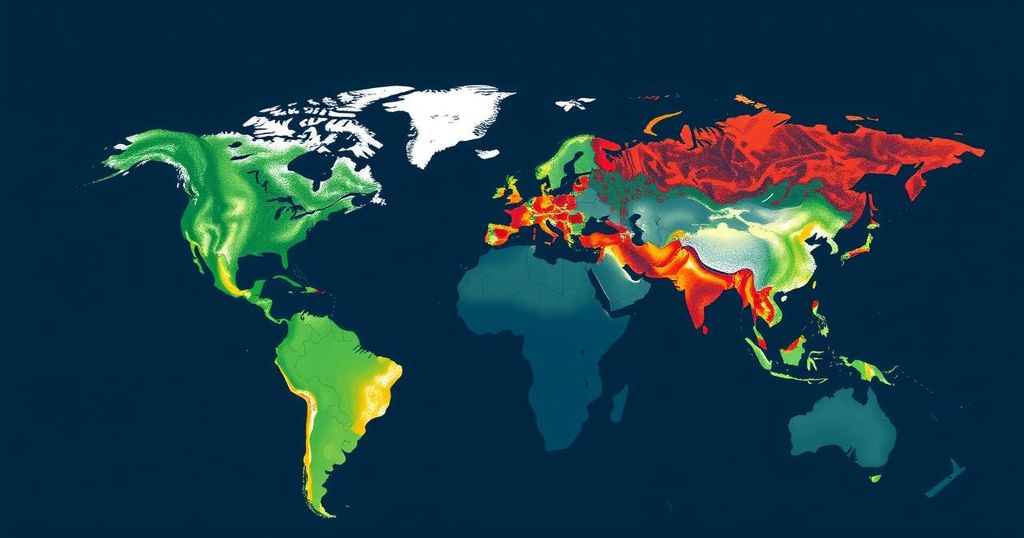COP29 Highlights Complications of War on Climate Negotiations
At COP29 in Baku, activists and leaders highlighted how ongoing wars complicate climate negotiations, emphasizing their detrimental effects on nations vulnerable to climate change. Key issues discussed included the financial support necessary from wealthier countries for developing nations, as well as the environmental damage caused by conflicts in Ukraine and Gaza. Participants called for redirecting military spending towards climate action to address these converging crises, stressing the importance of cooperation and solidarity in combating climate change.
At the recent COP29 climate talks in Baku, Azerbaijan, the ramifications of ongoing global conflicts were a significant focus among activists and leaders alike. Various participants, including Nisreen Elsaim, a climate activist from Sudan, emphasized how wars exacerbate vulnerabilities in nations most affected by climate change. Elsaim shared her own harrowing experience of fleeing civil war in Sudan; the devastation impacted not only lives but also agriculture and infrastructure crucial for adapting to climate change. This year’s summit’s primary objective involves negotiating financial assistance from wealthier nations to support developing countries in their climate adaptation efforts, yet such discussions are complicated by ongoing military conflicts, particularly in Ukraine and Gaza. Several world leaders expressed concern that geopolitical tensions and warfare detract from the urgent need to address climate crises. They noted that extreme weather conditions, worsened by climate change, aggravate poverty, energy insecurity, and resource scarcity. For instance, the President of Uzbekistan, Shavkat Mirziyoyev, articulated how climate change threatens global peace and stability. Activists utilizing the summit to call for climate justice underscored the need for solidarity across nations to effectively combat these overlapping crises. The wars in Ukraine and Gaza not only result in immediate humanitarian crises but also have significant environmental repercussions. Reports indicate that the conflict in Ukraine has released an astounding volume of greenhouse gases, equivalent to the emissions of a medium-sized country, thereby hindering global climate goals. Likewise, the military actions in Gaza have damaged essential infrastructure, including water and energy systems, undermining progress on key environmental initiatives. In Baku, activists criticized affluent Western nations for prioritizing military engagement over necessary climate financing. They argued for a paradigm shift wherein defense budgets could be redirected towards climate initiatives, thereby enhancing global resilience to climate change. Additionally, global conflicts were described as catalysts for compounded existential threats, stretching the capacity of governments to respond effectively to pressing global issues. Despite concerns about the disruption caused by ongoing conflicts, speakers at the summit, including representatives from the United Nations, stressed the importance of maintaining focus on climate action and cooperative efforts. Calls for urgent, transformative action to mitigate emissions and increase climate adaptation investments were echoed by various participants, underscoring the critical intersection of climate and geopolitical stability. The overarching sentiment at COP29 was that, even amid adversity, the world must not relent in the fight against climate change.
The United Nations climate talks, known as COP29, convened in Baku, Azerbaijan, drawing attention to the intricate connections between global conflict and climate change. The impact of warfare on climate adaptation has emerged as a pressing concern for many nations, particularly for those already vulnerable to the effects of climate change. Over the years, escalating wars have complicated negotiations and diverted resources away from essential climate initiatives while simultaneously exacerbating the humanitarian crises within impacted regions. Activists and leaders alike are calling attention to this critical intersection, seeking to emphasize that cooperation on climate issues is paramount for global stability.
In conclusion, the COP29 climate talks exemplify the complex interplay between warfare and climate change, with many leaders and activists articulating the urgent need for cooperation and support for vulnerable nations. The discourse around redirecting military spending towards climate initiatives reflects a growing recognition of the intertwined nature of these global crises. As international leaders strive to address both humanitarian and environmental challenges, their ability to foster a spirit of solidarity remains crucial in forging meaningful solutions and overcoming the obstacles posed by ongoing conflicts.
Original Source: apnews.com




Post Comment